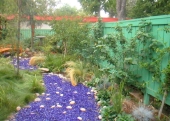Hi Allen, it is always difficult to know where to start...Usually the first step is observation:
So you know how your site grows with the way you were treating it before. If it is growing good weeds that isn't too bad soil! What sort of weeds are they? If those have been a problem, then a better management style for those is probably needed.
I'd also ask what is left of your plants that you want to keep?
Basics like site aspect (sun direction and exposure) climate zone and rainfall are helpful, as are your aspirations for the area: What do you want to get out and what are you prepared to put in in financial and labour contributions. How much time do you have, it that seasonal or only on exstablishment?
For me permaculture is about making connections, not just as people, but with the other resources we have around us. This helps to work with our situation rather than against it - for example are the plants you choose appropriate for your climate or will they need special protection? Are you going to walk through the garden everyday to work, or drive to it twice a year? So many questions









